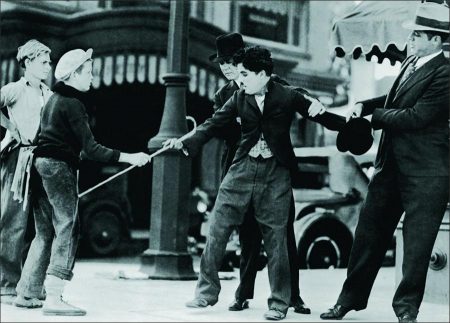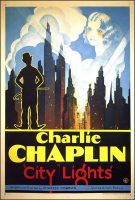City Lights (1931), subtitled “A Comedy Romance in Pantomime,” is generally viewed as Charlie Chaplin’s greatest film – a “silent film” released three years after the start of the talkies era of sound. The melodramatic film, a combination of pathos, slapstick and comedy, was a tribute to the art of body language and pantomime – a lone hold-out against the assault of the talking film.
It was well known that Chaplin preferred the silent art form to the advent of sound films. Chaplin was responsible for the film’s production, direction, editing, music, and screenplay (although assisted by Harry Crocker, Henry Bergman, and Albert Austin). The episodic film includes a complete musical soundtrack and various sound effects – but no speech or dialogue. Incredibly, Chaplin’s film was not nominated for a single Academy Award – to the pro-talking film Academy members, it must have appeared to be reversing the trend toward talkies and advanced sound films.
The tale of blind love again presents the famous Little Tramp character – an outcast, homeless man with his baggy pants, tight coat, cane, large shoes and small hat who first appeared in 1914 (and gave his final appearance in Modern Times (1936)). This ‘silent’ film is the quintessential Chaplin film – with superb examples of Chaplin’s (the Tramp’s) acting and artistic genius.
The film’s theme concerns the consequences (and suffering) resulting from the Tramp’s attachment and efforts to aid a blind girl (and restore her sight with money for an operation) and a millionaire, as he persuades both of them that life is worth living. Both characters cannot “see” him or recognize him for what he is. However, the Tramp functions as a savior and wish-fulfiller for the blind flower girl while masquerading as a wealthy duke.
For the drunk millionaire, the Tramp repeatedly saves the man’s life and provides a congenial friend. [Note: Baby-faced comic Harry Langdon’s best feature film in a short four-year film career, that was also director Frank Capra’s feature-film debut, was The Strong Man (1926) – it predated Chaplin’s City Lights (1931) by several years with its plot of a meek man in love with a blind woman.]
City Lights (1931)
Directed by: Charles Chaplin
Starring: Charles Chaplin, Virginia Cherrill, Florence Lee, Harry Myers, Al Ernest Garcia, Hank Mann, Jack Alexander, Victor Alexander, Albert Austin, Harry Ayers, Eddie Baker, Henry Bergman
Screenplay by: Charles Chaplin
Production Design by: Henry Clive
Cinematography by: Gordon Pollock, Roland Totheroh
Film Editing by: Charles Chaplin, Willard Nico
Music by: Charles Chaplin
Distributed by: United Artists
Release Date: January 30, 1931
Views: 268

